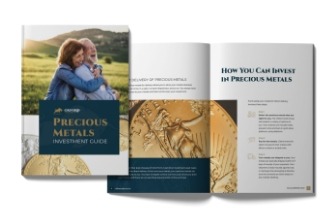Table of Contents
Before investing any of your hard-earned money, you want to feel confident that the investment products you choose will help meet your portfolio goals and provide excellent returns. Comparing gold and real estate is a great starting point as you determine how to shape and diversify your portfolio. But how can you tell which is the better option for you — if not a blend of both?
Read on to learn more.
Main Differences Between Gold and Real Estate as an Investment
Gold and real estate are vastly different assets, and each poses benefits and disadvantages for your portfolio. Understanding how these may or may not affect your investment journey can go a long way toward giving you confidence moving forward.
Liquidity and Accessibility
Gold is undoubtedly the more liquid and accessible investment. Still, depending on your resources and familiarity with the real estate market, you may feel just as confident investing in physical property.
You can easily purchase gold from online dealers, pawn shops, or in-person storefronts. When you’re ready to liquidate your investment, you can often resell it to your dealer at its spot price. Gold is also a relatively easy investment to understand, making it accessible to new investors.
With real estate, the buying and selling processes can take months. If you don’t have the cash, you must gain approval for a mortgage, then place a competitive offer, transfer over the deed and title, and sign a dozen papers at closing. Buying real estate can also involve a lot of back and forth with the seller and the mortgage lender, along with processes like inspections.
There’s no doubt about it — investing in real estate takes time. Selling a property is often just as convoluted as buying one. Moreover, real estate is inaccessible to investors who can’t afford a down payment or don’t qualify for a mortgage.
Diversification and Risk Management

Gold and real estate are capable of diversifying your investment portfolio. These assets offer different levels of volatility than stocks and bonds to balance out your investments. Like any investment, these investments involve certain levels of risk.
The spot price of gold typically trends upward over time but experiences the occasional dip in value. Investors typically view gold as a low-risk investment, but its returns are relatively low.
Real estate tends to be riskier, but the returns you experience directly correlate with your actions. If you pour money into high-quality upgrades, the property value should rise.
Tangibility
Investing in physical gold yields a tangible asset you can keep in your possession. Many investors enjoy being able to see the fruits of their investments.
Real estate also has a high level of tangibility, but your method of investing can affect this quality. Buying real estate investment trusts or investing in a real estate investment group (REIG) gives you less control over the property.
Financing
You’ll need to pay for a gold investment in cash. While you can take out a loan to fund a gold investment, doing so may not be a good idea unless you qualify for a low interest rate. Otherwise, the rate of return likely won’t match your interest rate, causing you to lose money.
(You can also roll over funds from an existing IRA into a gold-backed IRA as an alternative method of investing in gold.)
With real estate, you should have some cash to cover the down payment and closing costs. But many investors purchase real estate with mortgages. Again, ensure your interest rate is low enough that your returns exceed your monthly payments.
Once you have one property in your possession, you can use your principal as leverage to purchase more properties in the form of a second mortgage or a HELOC.
Volatility
Real estate is usually the more volatile investment of the two. Many factors affect the current value of real estate, such as interest rates, inventory of available properties, and inflation. You also need to consider market trends when preparing to buy or sell. Some markets make buying at the listing price next to impossible, while oversaturated markets can cause you to hold on to a property longer than you intended.
Gold is a relatively stable long-term investment, as its price has steadily risen over time. But in the short term, factors like inflation and supply and demand can impact its value. Most investment advisors will recommend holding on to your gold investment for at least several years.
Maintenance Costs
Real estate is an investment that requires ongoing maintenance to uphold its value. Whether renting out the property or using it as a primary dwelling, you should set aside 1% to 4% of the purchase price each year for regular maintenance and upkeep.
In contrast, gold itself doesn’t require any maintenance as long as you keep it in a temperature- and moisture-controlled environment. You must also factor in storage fees if you store your gold in a private vault or depository.
Historical Performance Between the Two Investments

If you plan to hold your investment for the long-term, knowing the historical performance of gold vs. real estate can help you predict which asset will perform best in your portfolio. Remember that both assets have some level of volatility and that past performance doesn’t always dictate the future.
Historical Performance of Gold
Because gold has been a form of currency for thousands of years, investors have access to a wealth of data detailing its performance. Here are a few long-term average returns on gold investments across various periods:
- 1972 to 2021 (49 years): 7.6%
- 2000 to 2021 (21 years): 8.3%
- 2010 to 2021 (11 years): 3.96%
- 2016 to 2021 (five years): 9.09%
You can see from this data that holding gold investments long-term doesn’t always increase your return rate. The shortest period in this list — 2016 to 2021 — has the highest rate of returns. In general, you should be prepared to hold your gold for a long time while keeping a close eye on its spot price from month to month.
Historical Performance of Real Estate
The cost of real estate has varied more significantly than the cost of gold. Some investors prefer volatile assets because with greater risk (potentially) comes greater reward. Examine the following annualized rates of return on real estate for the same periods as the example for gold:
- 1972 to 2021 (49 years): 5.25%
- 2000 to 2021 (21 years): 4.70%
- 2010 to 2021 (11 years): 5.34%
- 2016 to 2021 (five years): 7.73%
Of course, you have some control over the value of your real estate investment, such as if you make upgrades that increase the property value by more than their costs to implement. But you’ll only gain this benefit if you’re willing to put in the work to make the necessary upgrades. Some investors prefer a more hands-off investment.
How Are Gold and Real Estate Used as an Inflation Hedge?

Neither gold nor real estate are definitive inflation hedges, but both have qualities that could make them smart investments during periods of inflation.
Historically, gold has had an inverse relationship with inflation. In times of severe inflation, people often consider gold a stable place to put their money before it loses value. Consider the high inflation period in 2022, during which consumer prices rose by 9.1%. Meanwhile, the demand for gold rose by 12%.
By the same token, real estate values often increase with inflation rates. If you use your real estate as a rental property, you can also expect your investment to hedge against inflation — between May 2022 and 2023, rent prices increased by 8.4%.
Comparing Market Demand and Supply
Supply and demand can significantly impact the value of an asset, so how have these factors affected gold vs. real estate?
Gold and real estate are in limited supply. While we are nowhere near reaching the cap on either investment, mining for gold and building new real estate are time-consuming processes.
Gold tends to be in higher demand during periods of inflation. When inflation rates stabilize, fewer people convert their monetary assets into gold.
The demand for real estate often shifts with housing prices. When real estate costs rise, many people must rent housing instead of purchasing it outright. But of course, the demand for rental properties leads more investors to buy real estate that they convert into rental properties.
Which Investment Has Better Returns: Gold or Real Estate?
The rate of return for gold vs. real estate fluctuates, as you can see in the examples of annualized return rates we provided above. But because investors have more control over their real estate investments, these assets often provide higher returns.
What Are the Tax Implications of Investing in Gold and Real Estate?

The tax implications of gold vs. real estate depend on your investment method.
The IRS considers physical gold a “collectible,” and any profits you make on the sale of gold face the regular income tax rate. If you held your gold for over a year, your highest income tax rate would be 28%. Gold-backed ETFs also face income tax, while the IRS taxes gold mining stocks at the capital gains tax rate.
When you own property, you may face all of the following taxes:
- Property taxes, which can vary significantly depending on your district. (The U.S. average is 1.11%.)
- Net investment income tax if you have a high income and make money from your real estate investment
- Real estate income tax if you rent out your real estate
- Capital gains taxes if you sell your real estate for higher than its cost basis
- Individual income taxes if you don’t own property but invest in real estate-backed funds
Different Ways To Invest in Gold and Real Estate
You can invest in gold and real estate in various ways, allowing you to choose a method that best diversifies your portfolio and meets your investing goals.
With gold, you can:
- Buy physical gold bullion or coins
- Buy shares of gold ETFs
- Invest in a gold IRA
- Buy stock in gold mining companies
With real estate, you can:
- Purchase a personal dwelling to sell down the line
- Buy rental properties and make rental income
- Purchase real estate investment trusts
- Flip properties
- Join real estate investment groups
- Contribute to large real estate deals through online real estate platforms
How Much of Your Portfolio Should Be Allocated to Gold and Real Estate?

Investing in gold and real estate is a great way to diversify your portfolio. However, many investors recommend limiting alternative investments, depending on their type and the size of your portfolio. Talk to your investment advisor about the percentage of your assets to allocate to gold and/or real estate.
Gold and Real Estate: Advantages and Disadvantages
Advantages of gold:
- Has a relatively low volatility
- Is accessible to new investors
- Allows for a hands-off investing approach
Disadvantages of gold:
- Tends to have lower returns than real estate
- Offers little control from investors
Advantages of real estate:
- Allows investors to make changes to increase their returns
- Can involve many types of investments
- Offers a steady cash flow
Disadvantages of real estate:
- Has low liquidity
- Is not accessible to every investor
- Depending on the type of investment, requires ongoing maintenance
Is Gold a Safer Investment Than Real Estate?
Gold is a relatively safe investment in the long term, but its short-term value can fluctuate considerably. But because gold requires a lower upfront cost than real estate, and you don’t need to worry about unexpected maintenance costs, many investors consider gold safer than real estate.
Which Is Best for Long-term Investment?
If you’re wondering whether gold or real estate is the better long-term investment, consider your goals. Do you want a hands-off investment that grows steadily over time? If so, then gold may be the right choice. Do you want a steady cash flow from an investment you have extensive control over? In that case, real estate may be better.
At Oxford Gold Group, we make gold investing simple. Browse our physical gold products today.








